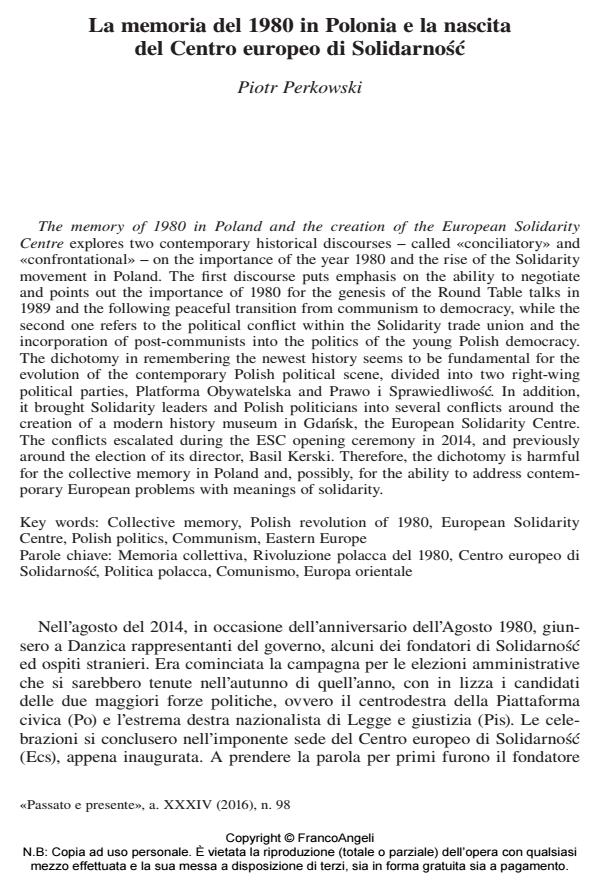La memoria del 1980 in Polonia e la nascita del Centro europeo di Solidarnosc
Titolo Rivista PASSATO E PRESENTE
Autori/Curatori Piotr Perkowski
Anno di pubblicazione 2016 Fascicolo 2016/98
Lingua Italiano Numero pagine 19 P. 91-109 Dimensione file 150 KB
DOI 10.3280/PASS2016-098005
Il DOI è il codice a barre della proprietà intellettuale: per saperne di più
clicca qui
Qui sotto puoi vedere in anteprima la prima pagina di questo articolo.
Se questo articolo ti interessa, lo puoi acquistare (e scaricare in formato pdf) seguendo le facili indicazioni per acquistare il download credit. Acquista Download Credits per scaricare questo Articolo in formato PDF

FrancoAngeli è membro della Publishers International Linking Association, Inc (PILA)associazione indipendente e non profit per facilitare (attraverso i servizi tecnologici implementati da CrossRef.org) l’accesso degli studiosi ai contenuti digitali nelle pubblicazioni professionali e scientifiche
Centre explores two contemporary historical discourses - called «conciliatory» and «confrontational» - on the importance of the year 1980 and the rise of the Solidarity movement in Poland. The first discourse puts emphasis on the ability to negotiate and points out the importance of 1980 for the genesis of the Round Table talks in 1989 and the following peaceful transition from communism to democracy, while the second one refers to the political conflict within the Solidarity trade union and the incorporation of post-communists into the politics of the young Polish democracy. The dichotomy in remembering the newest history seems to be fundamental for the evolution of the contemporary Polish political scene, divided into two right-wing political parties, Platforma Obywatelska and Prawo i Sprawiedliwos´c´. In addition, it brought Solidarity leaders and Polish politicians into several conflicts around the creation of a modern history museum in Gdan´sk, the European Solidarity Centre. The conflicts escalated during the ESC opening ceremony in 2014, and previously around the election of its director, Basil Kerski. Therefore, the dichotomy is harmful for the collective memory in Poland and, possibly, for the ability to address contemporary European problems with meanings of solidarity.
Parole chiave:Memoria collettiva, Rivoluzione polacca del 1980, Centro europeo di Solidarnos´c´, Politica polacca, Comunismo, Europa orientale
Piotr Perkowski, La memoria del 1980 in Polonia e la nascita del Centro europeo di Solidarnosc in "PASSATO E PRESENTE" 98/2016, pp 91-109, DOI: 10.3280/PASS2016-098005